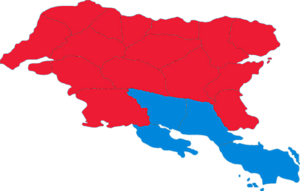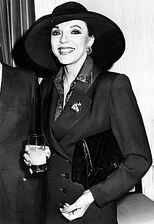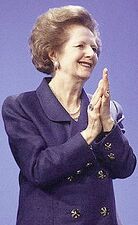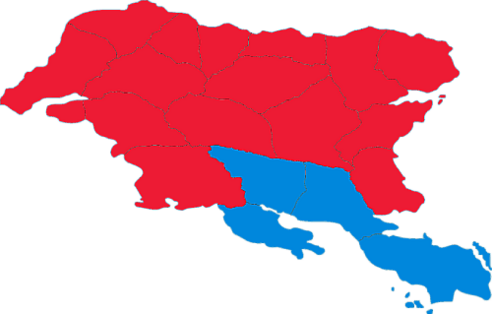Gylian presidential election, 2003
| |||||||||||||||||
| Turnout | 94,4% | ||||||||||||||||
|---|---|---|---|---|---|---|---|---|---|---|---|---|---|---|---|---|---|
| |||||||||||||||||
 | |||||||||||||||||
| |||||||||||||||||
A presidential election was held in Gylias on 22 January 2003.
Incumbent Gianna Calderara was re-elected, defeating the National Bloc's candidate Margaret Roberts.
Procedure
The election was held through instant-runoff voting.
Candidates were registered with Elections Gylias in accordance with normal procedures. They could either be nominated by a political party or electoral bloc, civic organisations, or self-nomination as independents.
Candidates
| Candidate | Nominator | Office(s) held | Details | ||
|---|---|---|---|---|---|
| Gianna Calderara | 
|
Progressive Alliance | President of Gylias (since 1991) |
Campaigned as the main leftist candidate. | |
| Margaret Roberts | 
|
National Bloc | Governor of Ḑarna (1982–1998) |
Campaigned as the main conservative candidate. | |
| Keie Nanei | 
|
Independent | None | Campaigned on a satirical platform. | |
| Atyol Aurea | 
|
Love, Nature, Democracy | President of the Gender and Sexuality Rights Association of Gylias (2000–2001) |
Campaigned on promotion of sexarchism and trans rights. | |
| Amanda Leloup | 
|
OMFLG–ACFEN | Governor of Nezyál (1970–1978) |
Campaigned on promotion of francité. | |
| Şesa Enis | Independent | None | Campaigned on promotion of philosophy. | ||
Results
| Candidate | Nominator | First count | % | Final count | % | |
|---|---|---|---|---|---|---|
| Gianna Calderara | PA | 2.547.811 | 20,0% | 6.526.155 | 59,5% | |
| Margaret Roberts | NB | 2.421.695 | 19,0% | 4.442.173 | 40,5% | |
| Keie Nanei | Independent | 2.393.669 | 18,8% | |||
| Atyol Aurea | Love, Nature, Democracy | 2.165.640 | 17,0% | |||
| Amanda Leloup | OMFLG–ACFEN | 2.127.422 | 16,7% | |||
| Şesa Enis | Independent | 764.343 | 6,0% | |||
| Others/write-ins | 318.476 | 2,5% | ||||
| Total | 12.739.056 | 100% | 10.968.327 | 100% | ||
| Registered voters and turnout | 13.770.166 | 94,4% | ||||
Maps
Analysis
Incumbent president Gianna Calderara made the decision to run for a fourth term, which would make her the second longest-serving president after Reda Kazan. Reliably backed by the Progressive Alliance and still very popular, she was considered the front-runner of the race, with the question being whether she would be challenged by a strong rival.
From the National Bloc, former Governor of Ḑarna Margaret Roberts made another attempt at the presidency, after having finished third in 1999 and been eliminated before the final round. With a somewhat less personality-dominated race than 1999, her chances were viewed as stronger, at least to reach the final round. During the campaign, she emphasised her green conservatism and record of fighting extremism as governor, and embraced her age as the oldest candidate in the running.
The two new presences that shook up an otherwise stale campaign were the independent Keie Nanei and Love, Nature, Democracy-supported Atyol Aurea. Keie was one of Gylias' most popular columnists, and treated her campaign like an extension of her commentary, playing up her anachronistic alter ego and using a humorous platform that poked fun at Gylian public life.
Atyol was a high-profile media personality, writer, and LGBT rights activist, who had served as President of the Gender and Sexuality Rights Association of Gylias. Her campaign emphasised her transgender identity and flamboyant personality, in the tradition of Tina Jørgensen, and her platform strongly focused on trans rights. Free Gylias commented that Atyol's campaign was the extension of "an internal debate as old as time" over the aims and methods of LGBT social movements. Despite this, she became a highly popular candidate due to the playful tone of her campaign.
Returning from her second place finish in 1999, Amanda Leloup now took up the mantle of francité candidate after Françoise Chatelain's death. The final candidate was Şesa Enis, a philosophy professor at the University of Mayt, who stood on promotion of philosophy, freethought, and secular humanism. Keie jokingly wrote that he was "a serious and earnest man, doing his best to argue his position in public meetings … poor bastard never stood a chance."
In the first round, Gianna improved on her 1999 performance, winning 20% of first preference votes. Margaret took second place with 19%, thus avoiding the embarrassment of four years before. Keie finished a strong third, only some 28.000 first preference votes behind Margaret, and in the absence of an official liberal candidate, won pluralities in the traditional liberal strongholds of Arxaþ, Alţira, and Elena.
Atyol finished fourth with 17% of first preference votes, winning pluralities in Mişeyáke, Sváen, and Arsad, and finishing second in Nezyál, Herlan, and Tomes.
Amanda's fifth place and 16,7% of first preference votes was only a small decline from Françoise's 17,2% high-water mark in 1999, and she repeated Françoise's pluralities in Herlan, Tomes, and Nauras, while gaining Nezyál on the back of her previous gubernatorial term. Şesa was the poorest performing candidate, finishing last with 6% of first preference votes and no pluralities in any region.
In the final round, Gianna generally gained transfers from Atyol's voters, and Margaret generally gained transfers from Şesa's voters. Keie and Amanda's voters proved highly volatile, but in the end, Gianna won by the largest victory margin since 1975: 59,5% to Margaret's 40,5%.
The margin of final preference votes was reflected in the map, with Gianna winning pluralities in 16 regions to Margaret's 4. Margaret gained no regions in the final round, and in fact lost Tandar to Gianna following transfers. Keie was unsurprised by Margaret's loss, commenting that by this time, Gianna had completed her evolution to a full-blown conservative socialist, which cut heavily into Margaret's support base.




